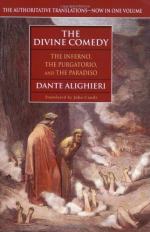“Brother! no eye of man not perfected,
Nor fully ripen’d in the flame of love,
May fathom this decree. It is a mark,
In sooth, much aim’d at, and but little kenn’d:
And I will therefore show thee why such way
Was worthiest. The celestial love, that spume
All envying in its bounty, in itself
With such effulgence blazeth, as sends forth
All beauteous things eternal. What distils
Immediate thence, no end of being knows,
Bearing its seal immutably impress’d.
Whatever thence immediate falls, is free,
Free wholly, uncontrollable by power
Of each thing new: by such conformity
More grateful to its author, whose bright beams,
Though all partake their shining, yet in those
Are liveliest, which resemble him the most.
These tokens of pre-eminence on man
Largely bestow’d, if any of them fail,
He needs must forfeit his nobility,
No longer stainless. Sin alone is that,
Which doth disfranchise him, and make unlike
To the chief good; for that its light in him
Is darken’d. And to dignity thus lost
Is no return; unless, where guilt makes void,
He for ill pleasure pay with equal pain.
Your nature, which entirely in its seed
Trangress’d, from these distinctions fell, no
less
Than from its state in Paradise; nor means
Found of recovery (search all methods out
As strickly as thou may) save one of these,
The only fords were left through which to wade,
Either that God had of his courtesy
Releas’d him merely, or else man himself
For his own folly by himself aton’d.
“Fix now thine eye, intently as thou canst,
On th’ everlasting counsel, and explore,
Instructed by my words, the dread abyss.
“Man in himself had ever lack’d the means
Of satisfaction, for he could not stoop
Obeying, in humility so low,
As high he, disobeying, thought to soar:
And for this reason he had vainly tried
Out of his own sufficiency to pay
The rigid satisfaction. Then behooved
That God should by his own ways lead him back
Unto the life, from whence he fell, restor’d:
By both his ways, I mean, or one alone.
But since the deed is ever priz’d the more,
The more the doer’s good intent appears,
Goodness celestial, whose broad signature
Is on the universe, of all its ways
To raise ye up, was fain to leave out none,
Nor aught so vast or so magnificent,
Either for him who gave or who receiv’d
Between the last night and the primal day,
Was or can be. For God more bounty show’d.
Giving himself to make man capable
Of his return to life, than had the terms
Been mere and unconditional release.
And for his justice, every method else
Were all too scant, had not the Son of God
Humbled himself to put on mortal flesh.
“Now, to fulfil each wish of thine, remains
I somewhat further to thy view unfold.
That thou mayst see as clearly as myself.




